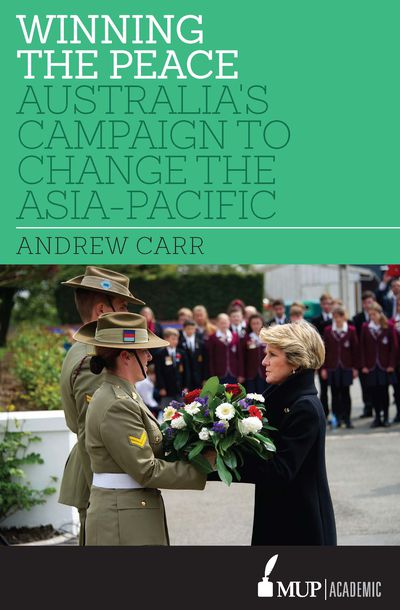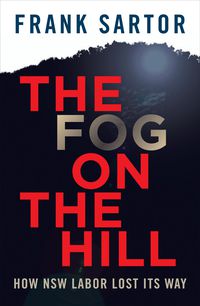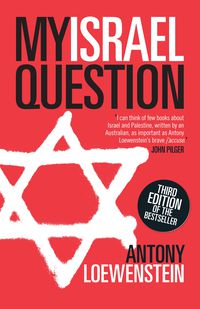Winning the Peace
Australia's Campaign to Change the Asia-Pacific
Andrew Carr
Paperback
Out of stock
$59.99
Member discount
As an MUP member you get 40% off the price of this book.
Member discount
As an MUP member you get 40% off the price of this book.
Member discount
As an MUP member you get 100% off the price of this book.
Member discount
As an MUP member you get 25% off the price of this book.
Member discount
As an MUP member you get 25% off the price of this book.
Member discount
As an MUP member you get 25% off the price of this book.
Member discount
As an MUP member you get 40% off the price of this book.
Member discount
As an MUP member you get 10% off the price of this book.
Member discount
As an MUP member you get 35% off the price of this book.
Member discount
As an MUP member you get 40% off the price of this book.
Winning the Peace
Australia's Campaign to Change the Asia-Pacific
Andrew Carr
Winning the Peace explores how Australian governments have engaged with Asia over the last thirty years, attempting to use their defence and foreign policies to shape the region.
While there were times of tension during this period—such as the spikes around the end of the Cold War and during the early years of the War on Terror—the Asian region has been largely defined by peace. Because of this peace and thanks to Australia's relative size as a middle power, governments' attempts to change how other states act and think has not been through the use of force but by military and diplomatic engagement and persuasion.
Australia's smaller size has also meant it has had to be strategic in its efforts: to determine which changes were priorities, to reorganise and develop resources, to deploy those resources effectively and efficiently, and to sustain its efforts in the face of competition and rejection…
While there were times of tension during this period—such as the spikes around the end of the Cold War and during the early years of the War on Terror—the Asian region has been largely defined by peace. Because of this peace and thanks to Australia's relative size as a middle power, governments' attempts to change how other states act and think has not been through the use of force but by military and diplomatic engagement and persuasion.
Australia's smaller size has also meant it has had to be strategic in its efforts: to determine which changes were priorities, to reorganise and develop resources, to deploy those resources effectively and efficiently, and to sustain its efforts in the face of competition and rejection…
Winning the Peace explores how Australian governments have engaged with Asia over the last thirty years, attempting to use their defence and foreign policies to shape the region.
While there were times of tension during this period—such as the spikes around the end of the Cold War and during the early years of the War on Terror—the Asian region has been largely defined by peace. Because of this peace and thanks to Australia's relative size as a middle power, governments' attempts to change how other states act and think has not been through the use of force but by military and diplomatic engagement and persuasion.
Australia's smaller size has also meant it has had to be strategic in its efforts: to determine which changes were priorities, to reorganise and develop resources, to deploy those resources effectively and efficiently, and to sustain its efforts in the face of competition and rejection.
Winning the Peace focuses on the three main 'campaigns' Australian governments have undertaken since the early 1980s to reshape the Asia-Pacific region in the national interest.
While there were times of tension during this period—such as the spikes around the end of the Cold War and during the early years of the War on Terror—the Asian region has been largely defined by peace. Because of this peace and thanks to Australia's relative size as a middle power, governments' attempts to change how other states act and think has not been through the use of force but by military and diplomatic engagement and persuasion.
Australia's smaller size has also meant it has had to be strategic in its efforts: to determine which changes were priorities, to reorganise and develop resources, to deploy those resources effectively and efficiently, and to sustain its efforts in the face of competition and rejection.
Winning the Peace focuses on the three main 'campaigns' Australian governments have undertaken since the early 1980s to reshape the Asia-Pacific region in the national interest.
“
This book sets out to critically examine the claims of policy makers and scholars that middle powers can influence the norms of the regional and international system.”
Andrew CarrPaperback
Out of stock
$59.99
Member discount
As an MUP member you get 40% off the price of this book.
Member discount
As an MUP member you get 40% off the price of this book.
Member discount
As an MUP member you get 100% off the price of this book.
Member discount
As an MUP member you get 25% off the price of this book.
Member discount
As an MUP member you get 25% off the price of this book.
Member discount
As an MUP member you get 25% off the price of this book.
Member discount
As an MUP member you get 40% off the price of this book.
Member discount
As an MUP member you get 10% off the price of this book.
Member discount
As an MUP member you get 35% off the price of this book.
Member discount
As an MUP member you get 40% off the price of this book.






